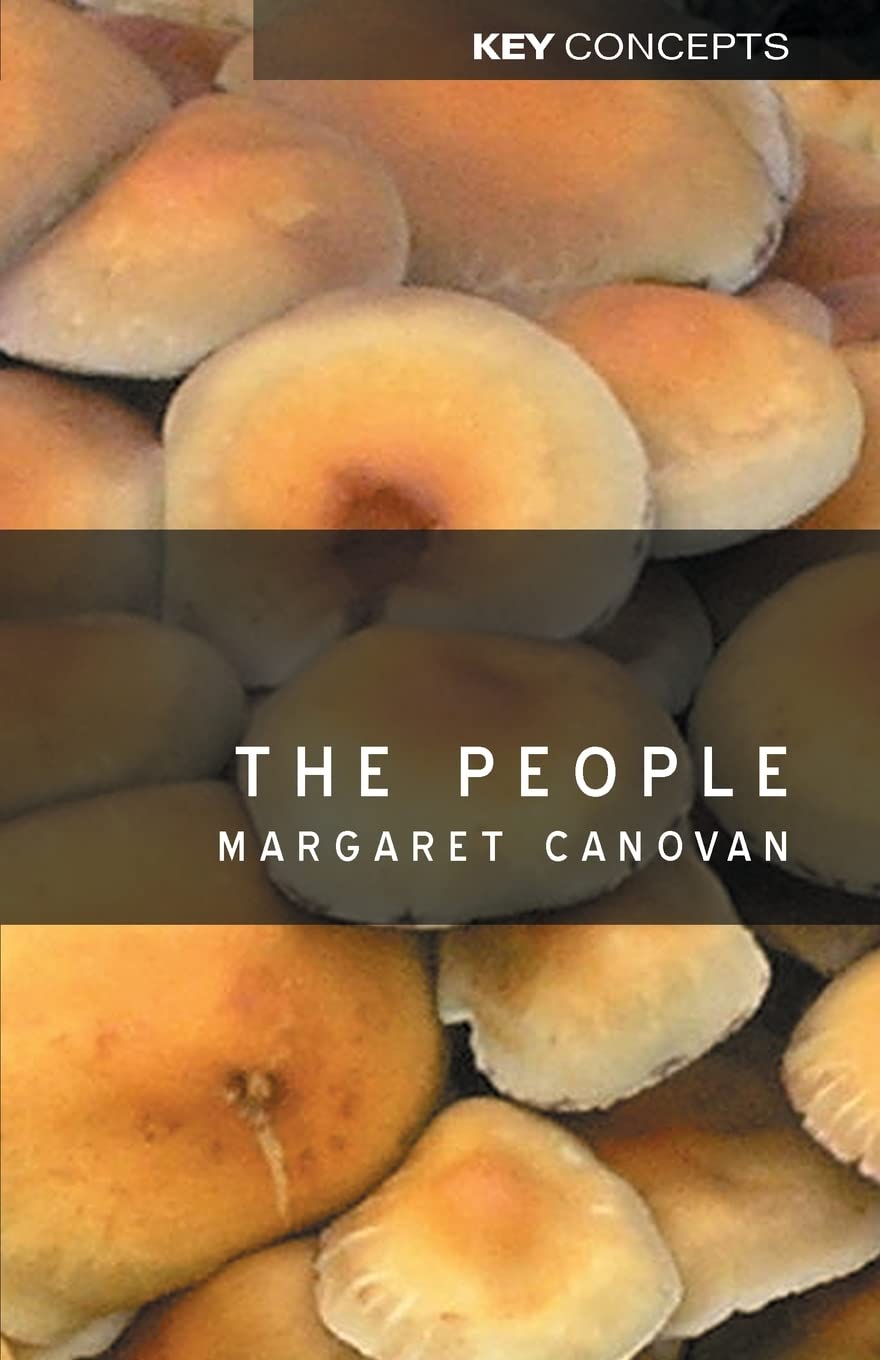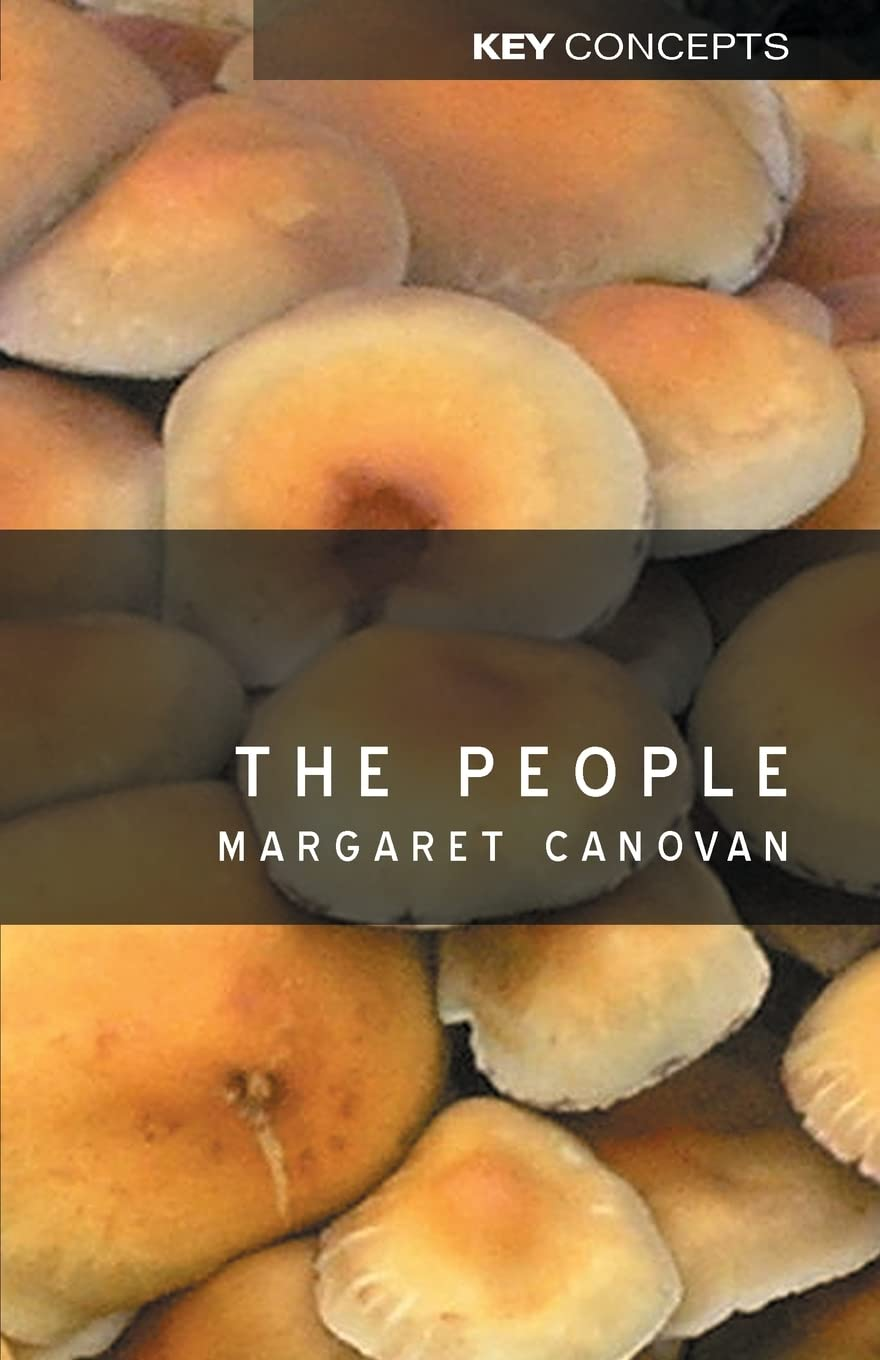Margaret Canovan, The People


Margaret Canovan, The People (Polity, 2005)
It may seem that twenty years ago was a calmer, more peaceful time than it is now, at least in the (possibly post-pandemic, but arguably authoritarian) USA. But recalling the names of a few heads of state around the world in 2005 may remind us that there has never really been what ought to be called a placid year for human beings–even if the climate has surely gotten worse. In 2005, e.g., Berlusconi was running Italy, and while Putin and Erdogan had different official titles back then than they do now, each could reasonably be called the “Supreme Leader” of his country both in 2005 and throughout the intervening period since then. Ayatollah Khamenei too (a man who has actually had that official title since his rise to power). Whether there has been an overall improvement in political conditions is, unsurprisingly, a difficult call. On the plus side of the democracy ledger for that bygone time, Bush was more interested in complying with laws than Trump, and Modi is worse than Singh. But Italy, Mexico and Argentina are more democratic than they were back then. (Ukraine too, but, of course, other issues have come to the fore there.)
In any case, 2005 was the year of the publication of The People, Margaret Canovan’s final book, and, like its 1981 predecessor, Populism, is justly considered a classic work on issues that include the genesis of national identity and the basis of sovereignty. Certainly, however, some significant changes have taken place in the world since 2005 (other than the sad fact of Canovan’s passing in 2018). For example, AI came into being and almost immediately began being used for the dissemination of deep fakes. And the theory of “alternative facts,” while nothing new, has received numerous useful epicycles. Those following what’s happening in the U.S. will of course know that that country can no longer be pointed to as an example that can be used by the EU (or anybody else) to show how one may intentionally “forge” a populace into a beloved country. Surely a few (amusing? depressing?) anachronisms pop up in the book. For example, Canovan asks: “How can there be scope for mobilization to 'take back' the people's government in stable, well-established liberal democracies like the USA, Canada, Australia and Western Europe?” And we may look back with regret when she remarks first that “The United States of America has seemed to some to show that a single people with powerful political solidarity is possible in conditions of ethnic diversity.” (Ach, it may once have been so!) Then she proclaims that “The most civic and least ethnic [unified national people] of all…is of course American nationhood, in which a population drawn from remarkably diverse ethnic and national origins is united in a collectivity of formidable solidarity.” (Alas!) And there is also this depressing gem: “The USA’s remarkable capacity to integrate diverse ethnic groups into the nation owes a good deal to the priority given to peoplehood.” In the immortal words of Steely Dan, “Those days are gone forever; over a long time ago.” It should be quite obvious that today, nearly half of the U.S. population is striving with all its might to be the exact opposite of the country claimed to be such a paragon in 2005.
One of Canovan’s main goals in her illuminating book is to point out the often misleading ambiguity of the term used for her title. She points out that ‘the people’ is sometimes used to refer to everybody in the world; but sometimes, following the Roman populus idea, is intended to be limited to a particular group that has been, in a sense, willed into existence by the causal results of past political city- or nation-building. Indeed, it is sometimes claimed that only “common folk,” i.e., peasants, working people, the uneducated, or destitute deserve the title. But of course many others have used the phrase to express something about a group with a particular ethnicity, culture, religion, or language. Canovan notes that those usages that refer to groups that arguably came into existence more ‘naturally,’ and are thus less a result of intentional polity building than of ‘organic history,’ have been associated with romanticism of the Hegelian type. According to the not necessarily globalist, but certainly more Roman and intellectualist take, the people are an artifact rather than a natural, organic entity: almost willed into being by political action.
But, as even an intentionally constructed people, like the EU for example, can be expected to hang tightly together only after at least a couple of generations of “patriotic sentiment” (analogous, to the heartfelt support for a particular Premier League team), there is a danger that centrifugal forces will tear any constructed, purely artifactual group apart before very long–especially in today’s environment of growing ‘populist’ movements and constant mass-migrations. The center seems quite unlikely to hold if the only ‘glue’ has been synthesized from political movements rather than oozing slowly and organically from an unconscious historical telos.
This paradox evidently gnaws at Canovan, who isn’t ready to accept the artificial horn of the dilemma, as Hobbes did. He wrote, It's a great hindrance to Civill Government, especially Monarchicall, that men distinguish not enough between a People and a Multitude. The People is somewhat that is one, having one will, and to whom one action may be attributed; none of these can properly be said of a Multitude. The People rules in all Governments, for even in Monarchies the People Commands; for the People wills by the will of one man ... in a Monarchy, the Subjects are the Multitude, and (however it seeme a Paradox) the King is the People. It seems likely that for this Hobbesian sort of ‘people’ to come into existence, some sort of social contract was necessary. But as we now know, there has never actually been anything of that sort.
Canovan thus indicates that she thinks Habermas’ globalist take on the possibility of a unified, patriotic Europe was always unrealistic, not only because without an explicit contract there will be insufficient centripetal force, but also because she doubts that the dichotomous picture Habermas relied on–organic vs. constructed–ever told the entire story. It is rather the case, in her view, that even if a unified ‘people’ might grow up in a not-strictly-organic way, no such nationalistic people may exactly be willed into existence either. Success may rely as much on a bunch of fortunate, territory-specific accidents as it does on any intentional activities.
Furthermore, although ‘human rights’ seem lovely and have thus been ‘naturally’ sought by multitudes throughout history, even if they are ‘universal’ in some God’s eye view, they tend to be made available to actual human beings only in certain places. That being the case, it was quite clear to Canovan in 2005, just as it has been to political observers for centuries, that “no political party in a democratic state [can] win an election by promising to open the borders to all comers.” That has meant that as ideas of human rights have broadened, insider status has become increasingly valuable.*
At least since the French Revolution, the people have been widely understood to be the fount of sovereignty. Sometimes this has just meant that whoever does the actual governing must ultimately answer to this group. But at other times, more radical democrats have taken the view that nobody else, no ‘delegates’ of the populace, should be allowed to manipulate the levers of power at all–at least not without explicit instructions and serious penalties for noncompliance. Clearly, however, most resorts to ‘people power’ have not required the general populace to do much more than vote occasionally.’ Indeed, it has not been unusual for even the most autocratic governments to assign sovereignty to ‘the people’: tyrants regularly claim a mandate from the whole population. Canovan infers from this that “instead of requiring a special and very rare form of government, popular authorization lies behind all forms, even those that seem most distant from popular power. One implication is that popular consent does not in itself do anything to mandate popular government.” (For what it’s worth, I believe that argument is unsound: claiming popular authorization is not the same thing as actually having it; and even if it were, the conclusion wouldn’t follow.)
In any case, it has not just been monarchs or other dictators who have claimed to be following a mandate of ‘the people.’ In 17th Century England for example, during their struggle with Charles I, members of Parliament took it for granted that they themselves were for all practical purposes 'the people'--and that notion hasn’t really changed pursuant to the UK concept of democracy.
The US Constitution took a quite different tack. As Canovan puts it, Hamilton and Madison left no doubt that the sole role of the people, in their collective capacity, was to vote once in a while. She writes, “This was popular government by election, defining the people as voters and thereby bringing them into government while at the same time keeping them at a distance. [And that] set the stage for populism in the sense of movements to give government back to the people.”
Clearly, the various concepts of sovereignty must be intertwined with one or more concepts of the people if a coherent story is to be put together. And again, whatever power ‘the people’ are said to hold, one may reasonably ask whether this authority is wielded only by a subgroup, say ‘the common folk’ or the proletariat. Or, alternatively, it may be wondered if it is only the property-owning, tax-paying educated subgroup, or those of a particular race/gender/culture that ought to be put at the helm. And once this is decided (or perhaps before!) we must turn to the question of geography. Are the levers to be held by such anointed group wherever its members may be found–or in some particular region only? As can be seen, the permutations are dizzying.
Canovan notes that the characteristics of the ‘special folk’ can be oddly specific: "'We are the People', chanted the East German demonstrators in 1989 - we, the protestors, not you, the regime - implying that authority and right were therefore on their side. And she adds that in the decade that followed the collapse of Communism, in conjunction with a new UN resolution that granted all manner of rights to nearly everyone over the age of three, bitter wars were fought in the Balkans and elsewhere as rival 'peoples’ claimed such benefits. After all, “if 'the people' can…confer legitimacy on boundaries, constitutions, regimes and policies, all sorts of groups and interests have an incentive to claim that they are or speak for the people.”
Groups said to be affirming populism regularly complain that “power has been stolen from the people by politicians and special interests.” But can a ‘people’ be identified that can legitimately be contrasted with these alleged power holders? And if not, what are the prospects for democracy? As Canovan notes, whether or not Populists have a bad name, “their trump card, the belief in popular sovereignty, lies at the heart of democracy itself.”
The author is acutely aware of the paradox that ensues from attempting to democratically determine the boundaries–territorial or otherwise–of a people. For…who should be allowed to vote on this question? But, if not by plebiscite, just how IS this matter to be worked out? According to Canovan, at about the beginning of the 19th Century, the classical republican ideal of the city-state, still cherished by Rousseau, was abruptly displaced by a new enthusiasm for the 'tribe', the barbarian ancestors to which nineteenth-century Romantic nationalists looked for the ethnic origins of their nations.” Canovan asks us how it is possible that populists “who are widely regarded as threats to democracy can claim that they themselves are the real democrats, expressing what the people really think and articulating concerns ignored by politicians but close to the people's hearts.”
As those familiar with my own writings will know, partly through definitional clarification, I prefer to limit the term “populism” to democracies of a certain type. I insist, e.g., that (Fishkin notwithstanding) they must at least have robust recall and referendum mechanisms. And while it has often been observed that a typical feature of so-called “New Populist” movements is a dependence on personal leadership in place of institutional party structures, I don’t make any such characteristics essential to populism. One may agree with Canovan (and Manin) that Populism is regularly associated with the weakening of traditional party structures without requiring that such moves are required by the concept. So in my opinion, wide suffrage and identity of the weights of both votes and voters–Yes. Prohibitions of parties or critical speech–No. Without clarification, we are put in a position where, on one hand populists are widely regarded as threats to democracy, and on the other it is common to find a political elite composed of professional pols who themselves court voters by resorting to populist language as if populism is democracy’s last hope for continuance. In any case, it seems to me to make more sense to figure out precisely what should be thought to constitute populism, rather than take anybody’s word for either the incredible beauty or gross hideousness of some group’s alleged populist tendencies.**
There’s little doubt that (classical–not ‘leftist’ in the sense of leaning socialist) “liberalism” is an easier term to handle. We know it must always require individual freedoms–including those involving property rights; so, (if it is again carefully segregated from the more modern, income distribution sense of “liberal”) it should reflect relative comfort with unequal wealth–in spite of its insistence on ‘political equality.’ Classical liberalism is also generally comfortable with , indeed is often insistent upon, steady cultural and technological progress, and is therefore less prone to pine for the reinstatement of a glorious past era (real or imagined). But the liberal advocacy for individual rights and due process of law against arbitrary rule by the powerful–especially monarchs–has been maintained in the name of ‘the people’ since the time of the Levellers. So it is jarring to now see uprisings against such principles being called for on behalf of ‘the people’ here.
Canovan tells us that “of all 'the people's' ambiguities, it may be that the most crucial is its ambivalence between the everyday and the mythical: between the people as ordinary members of the population, and as transfigured into a People that has powers of political redemption.” She notes that Edmund Morgan credited English Parliamentarians during the reign of Charles I with the decisive role in the creation of this fiction when he wrote that “In order to liberate themselves not only from the King, but also from their own constituents, 'representatives invented the sovereignty of the people in order to claim it for themselves.”
Some have gone even farther. For example, Jens Reich agrees that transfiguring ordinary individuals into ‘the people’ requires a political setting and specific intentions. (Think of “Occupy Wall Street.”) But he is intrigued by the fact that it seems more difficult to get traction for a “people movement” in democratic polities. Lech Walensa may not have been as successful with his movement where liberal rights were available to more citizens. Why not? According to Reich, Communist leaders overestimated the power and significance of the street protests. He argues that “Leaders in democratic regimes are much less easily persuaded that crowds in the streets really are the People, because there, ruling elites learned long ago that people come and shout, get hungry and bored after a while and return home.” That’s why they don’t take protests so seriously. (It might also be argued, of course, that where rights are widely available to the public, there isn’t likely to be such an acute desire for reform among the citizenry.)
Canovan doesn’t quite share Reich’s skepticism. She thinks Solidarity was an example of the real deal and ought not to be sneered at. They may be rare creations, and there may be no particular sauce that can be pulled from the cabinet that will certainly bring ‘a people’ into existence. But she concludes that some ‘people myths’ “contain a kernel of truth about politics: where individual people do form 'a people' and act as 'the people', political power can come into being - perhaps momentarily, but sometimes in a solid, lasting fashion.”
* I discussed the many tensions that arise between globalist and tribalist views of human rights in detail in my review of the Martha Nussbaum/Joshua Cohen book, For Love of Country.
** For more on this, see my paper on the alleged dangers of “mob rule.”

About the Author
Walter Horn is a philosopher of politics and epistemology.
His 3:16 interview is here.
His blog is here